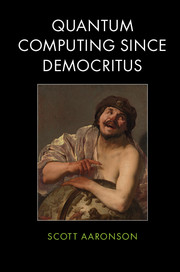Book contents
- Frontmatter
- Dedication
- Contents
- Preface
- Acknowledgments
- 1 Atoms and the void
- 2 Sets
- 3 Gödel, Turing, and friends
- 4 Minds and machines
- 5 Paleocomplexity
- 6 P, NP, and friends
- 7 Randomness
- 8 Crypto
- 9 Quantum
- 10 Quantum computing
- 11 Penrose
- 12 Decoherence and hidden variables
- 13 Proofs
- 14 How big are quantum states?
- 15 Skepticism of quantum computing
- 16 Learning
- 17 Interactive proofs, circuit lower bounds, and more
- 18 Fun with the Anthropic Principle1
- 19 Free will
- 20 Time travel
- 21 Cosmology and complexity
- 22 Ask me anything
- Index
- References
Preface
Published online by Cambridge University Press: 05 April 2013
- Frontmatter
- Dedication
- Contents
- Preface
- Acknowledgments
- 1 Atoms and the void
- 2 Sets
- 3 Gödel, Turing, and friends
- 4 Minds and machines
- 5 Paleocomplexity
- 6 P, NP, and friends
- 7 Randomness
- 8 Crypto
- 9 Quantum
- 10 Quantum computing
- 11 Penrose
- 12 Decoherence and hidden variables
- 13 Proofs
- 14 How big are quantum states?
- 15 Skepticism of quantum computing
- 16 Learning
- 17 Interactive proofs, circuit lower bounds, and more
- 18 Fun with the Anthropic Principle1
- 19 Free will
- 20 Time travel
- 21 Cosmology and complexity
- 22 Ask me anything
- Index
- References
Summary
A Critical Review of Scott Aaronson's Quantum Computing since Democritus by Scott Aaronson
Quantum Computing since Democritus is a candidate for the weirdest book ever to be published by Cambridge University Press. The strangeness starts with the title, which conspicuously fails to explain what this book is about. Is this another textbook on quantum computing – the fashionable field at the intersection of physics, math, and computer science that's been promising the world a new kind of computer for two decades, but has yet to build an actual device that can do anything more impressive than factor 21 into 3 × 7 (with high probability)? If so, then what does this book add to the dozens of others that have already mapped out the fundamentals of quantum computing theory? Is the book, instead, a quixotic attempt to connect quantum computing to ancient history? But what does Democritus, the Greek atomist philosopher, really have to do with the book's content, at least half of which would have been new to scientists of the 1970s, let alone of 300 BC?
Having now read the book, I confess that I’ve had my mind blown, my worldview reshaped, by the author's truly brilliant, original perspectives on everything from quantum computing (as promised in the title) to Gödel's and Turing's theorems to the P versus NP question to the interpretation of quantum mechanics to artificial intelligence to Newcomb's Paradox to the black-hole information loss problem. So, if anyone were perusing this book at a bookstore, or with Amazon's “Look Inside” feature, I would certainly tell that person to buy a copy immediately. I’d also add that the author is extremely handsome.
- Type
- Chapter
- Information
- Quantum Computing since Democritus , pp. ix - xxviiiPublisher: Cambridge University PressPrint publication year: 2013



